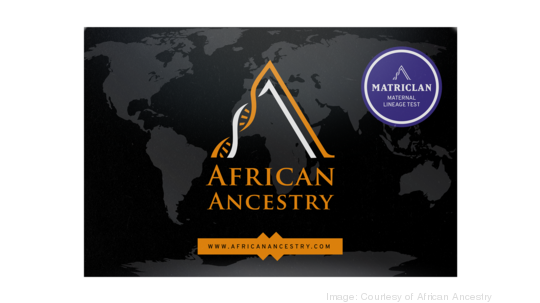
About the business: African Ancestry uses a genetic database specific to people of African descent to match customers with their DNA histories. The company’s two test kits use cheek swabs to record customer DNA and trace its origins to a specific African country and ethnic group, between 500 and 2,000 years back, either matrilineally or patrilineally.
“When you think about your history, you have to think about where you’re from, and African Ancestry is a tool to help with that,” said Gina Paige, African Ancestry’s president and co-founder.
The D.C. company employs 10 people and works with a handful of vendors that handle the company’s marketing and web services.
How it started: Paige co-founded African Ancestry with biologist Rick Kittles, who specializes in researching the genetics of people of African descent. Kittles is known for his work with Howard University anthropologists who researched the ancestry of enslaved Africans who were unearthed from a lower Manhattan mass grave in the 1990s — now a national historic monument, the African Burial Ground.
“Scientists identify a problem that’s close to them,” Paige said. “Rick has been compiling a database of African DNA to answer a very personal question for himself, which is, ‘Where am I from in Africa?’"
That’s the question that African Ancestry set out to answer for Black consumers in 2003.
“The reason why Black people have this question is the impact of the trans-Atlantic slave trade. Most of our colleagues and classmates and people we live and work with, they know where they’re from, even if it’s just a family story or a last name was consistent or family records,” Paige said. “We use DNA to do that because it is the only tool available for this particular group of people.”
The pandemic effect: Not unlike other e-commerce companies, business for African Ancestry exploded, even as it navigated a baseline of uncertainty, supported its employees and pivoted to 100% remote operations.
“We also experienced growth because of the civil unrest and the assault on Black people. It made the African American consumer look inward and explore who we are and remember who we are and want to dig into that identity in a different way than before,” Paige said. “It makes me sad that it took the death of George Floyd and the death of Breonna Taylor and others to precipitate that action.”
The pandemic pivot: The distribution of the company’s test kits is 99% online through its website, but that should change soon as African Ancestry recently enrolled in the pilot version of Amazon’s Black Business Accelerator, a $150 million investment to support Black entrepreneurs. The accelerator will act as an e-commerce hub for Black-owned businesses, while Amazon (NASDAQ: AMZN) supports its members with financial grants and incentives like advertising credit.

“Our competitors have been on [Amazon] for years,” Paige said.
African Ancestry has some universities, corporations and nonprofits as customers, but Paige said being established on Amazon allows the company to further build out its business-to-business distribution and expand to a broader market. She declined to disclose the number of tests she has sold over the years, except to say African Ancestry has “impacted the lives of more than 1 million people,” and its revenue grew 57% between 2018 and 2020.
The challenge today: African Ancestry used to deliver hard copies of genetic results to its customers through the mail, but that had to change with concerns during the pandemic about spreading coronavirus through surface contact. It was difficult, Paige said, to maintain the business’ same level of customer service and confidentiality of delivering the genetic results.
The company recently transitioned to being completely cloud-based, a milestone for the business — if it hadn’t, it would otherwise lag behind the technology of its competitors. Now, customers can track the progress of their cheek swab to the lab, and Paige said African Ancestry is working on making this transition as smooth as possible.
What’s next: African Ancestry will officially launch its Amazon store in early August. In the meantime, Paige said, the business is looking for ways to expand its research and offerings for more people of African descent, beyond just the psychological impact of knowing one’s roots.
Email mneibauer@bizjournals.com to share your business with us.